How RI immigrants are finding jobs and much more through nonprofit's contract with Amazon
PROVIDENCE — Lynnette Rivera stands in a circle with other Amazon delivery drivers. It's 10:15 in the morning, and the wind is blowing through the Rhode Island Community Food Bank parking lot. The drivers gather at the same time each day and talk before getting into vans, driving across the street to the Amazon warehouse and loading up for the day's deliveries.
Team leaders switch between English and Spanish, reminding Rivera and her fellow drivers to try to engage customers, to be courteous, to read the notes left for delivery and to take good pictures of where they left the delivery. They want to get customers to leave positive feedback.
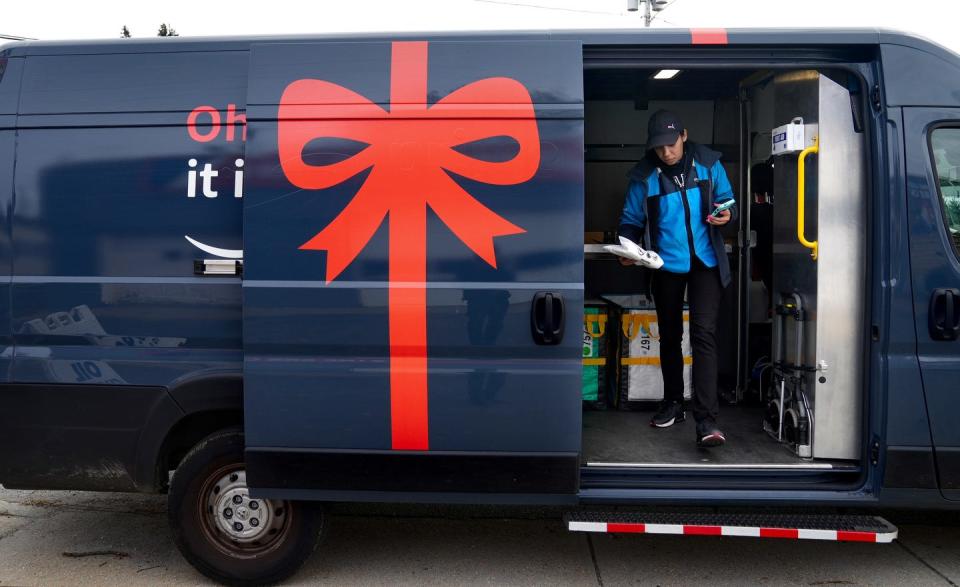
Remember your seatbelt, one of the team leaders says, as their internal ratings can be no higher than their lowest safety rating.
Rivera is part of a new type of delivery network, rivaling carriers like UPS and FedEx, which Amazon has built across the country, encompassing everything from cargo airplanes to tractor-trailers, from last-mile depots to sprawling warehouses.
This delivery network, built by Amazon, contracts out its delivery services to third parties, called "delivery service partners." The company's website entices would-be business owners, saying they'll need less than $10,000 in capital to get started. The program is often targeted at veterans.
"Use our technology, processes, and more than 20 years of logistics experience to set up and run your delivery business," according to the company's website advertising for delivery companies.
More: How Beautiful Day and granola are helping refugees get on their feet in Rhode Island
Rivera is also part of an even newer cohort of employees. While she is delivering for Amazon, her actual employer is Wutabon, Inc., a subsidiary of the social services nonprofit Quincy Asian Resources.
The group is trying a new way to serve the immigrant community by recognizing that people who must work to live have little time, or flexibility, for inflexible services.
Creating a 'workplace utopia' for immigrants
Rivera, 34, came back to Providence from Florida in 2020 to be near her family after a breakup.
A medical assistant in Florida, she began looking for a job when she moved to Providence. She found a new organization, Wutabon, subcontracting with Amazon to make deliveries.
The hours and the pay were good, with full benefits and paid time off. A year later, she is still on the job, driving a van with the Amazon logo emblazoned on the side, delivering to many of the same customers week in and week out in North Kingstown.
Wutabon's parent, Quincy Asian Resources, was founded in Quincy, Massachusetts, which is home to a large Asian population. The immigrant social services agency offers classes in English literacy, parenting, citizenship and even painting.
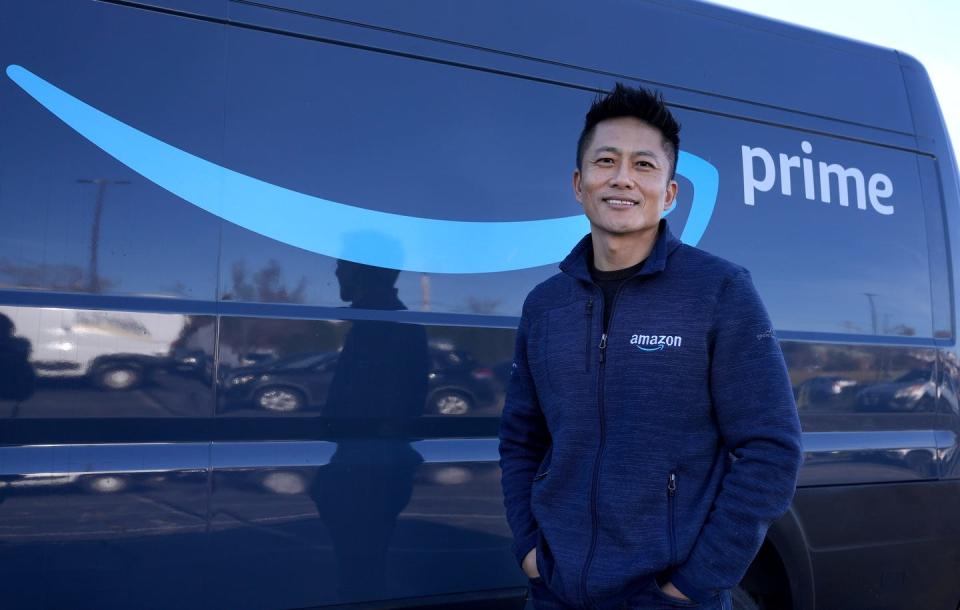
In 2018, the nonprofit's president and CEO, Philip Chong, decided that offering classes to people who are just trying to get by was not enough, and the agency began branching out to provide even more support to the immigrant community.
USA Today's Leaders of Change:Quincy Asian Resources' Philip Chong found his life calling by helping an entire community
"Immigrants often work 50 to 80 hours a week, so for them to be really able to come to a brick-and-mortar establishment and access programs is impossible or impractical," said Chong, who moved to the United States from Hong Kong at age 16 and was hired as the agency's first CEO in 2017.
"We're fighting for social innovation," he said. "That's what motivated us to bring services to the workplace."
Describing the concept of Wutabon as a "workplace utopia," Chong said the agency aims to provide jobs to immigrants along with needed resources, such as language and citizenship classes, delivered in a flexible way.
Most jobs have competing priorities: managing costs and maximizing productivity while making sure that enough people are scheduled to work the most unpopular shifts. Asking employers to let their employees leave to go to classes is often not feasible.
Wutabon's model avoids that conflict by bringing the resources, including classes, to the employees.
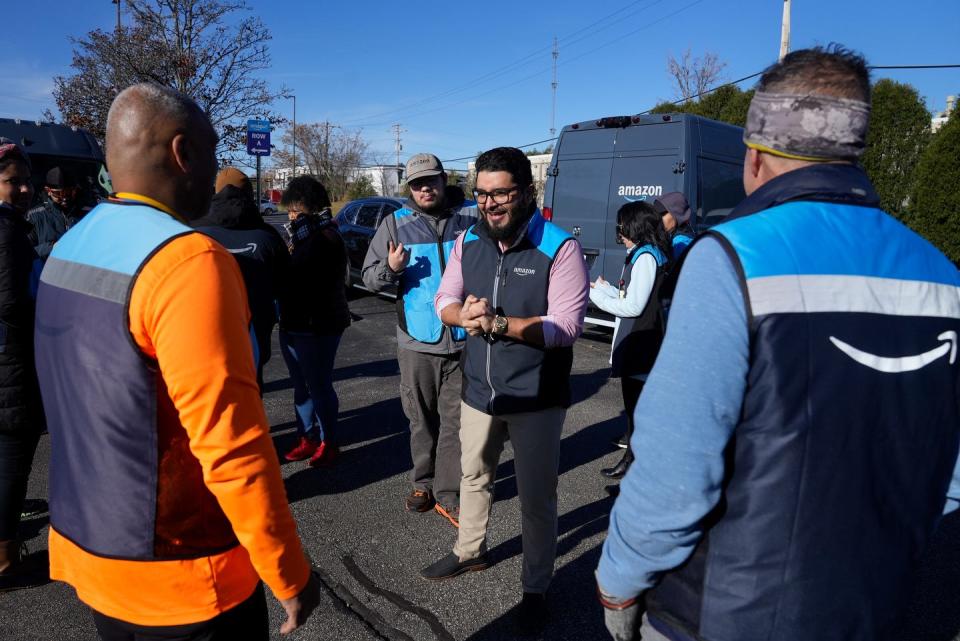
Pandemic changed the labor landscape, and the company adapted
Quincy Asian Resources began as an employer providing seamstresses for Brooks Brothers factories in New York and North Carolina. The partnership was going great until March 2020, when the world shut down because of the COVID pandemic. Demand for suits and slacks, dress shirts and ties dropped off a cliff as people stayed at home in sweatpants and the retailer filed for bankruptcy.
The immigrants hired to work the factories had valuable skills, and the company shifted to producing personal protective equipment, mainly face masks.
While the work shifted during the pandemic, so did the company, as it partnered with New York City to reopen closed Asian restaurants and provide culturally appropriate meals to seniors, delivering more than 200 million meals. That also provided work for the predominantly immigrant workforce in those restaurants, Chong said.
"We tapped into the tourism sector, because there were no more tourists, so the tour bus drivers became our delivery workforce, bringing the food to the elders," Chong said.
From delivering meals to delivering packages
Driving to her first delivery in North Kingstown one morning, Rivera said she likes her job. She sees a lot of different houses and places. A lot of the people are nice, helping her unload their hefty orders and leaving water and food at their front doors for the delivery people.
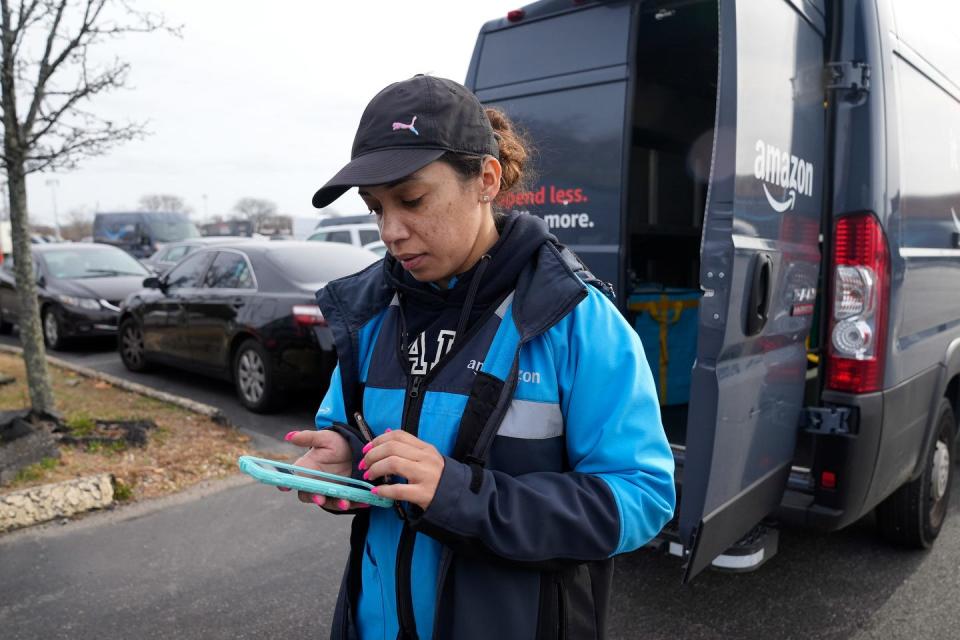
But there are challenges, and one of Rivera's biggest worries is dogs. Sometimes a whole pack will follow her to the door, even if the owner is there. Other times, they will run out the door when someone answers to get the package.
"You just have to be careful with dogs," she said. "There are a lot of dogs. It seems like every house has one."
Warehouse on a hill:Johnston council OKs tax deal on Amazon shipping facility
The agency's work to prepare and deliver meals for New York City during the pandemic caught the eye of Amazon, which has been building a delivery empire, including a massive facility in Johnston that is still being built, a warehouse in Providence and a warehouse in Fall River.
Chong said his nonprofit was the first to be approached by Amazon to become a delivery service partner. Amazon provides much of the logistics, supplies and branding, while Wutabon provides the workforce for one of the largest employers in the country.
"There is a lot, a lot, of support from Amazon," he said. "It's very turn-key, and we didn't need to come up with a big capital cost. What they're looking for is talent."
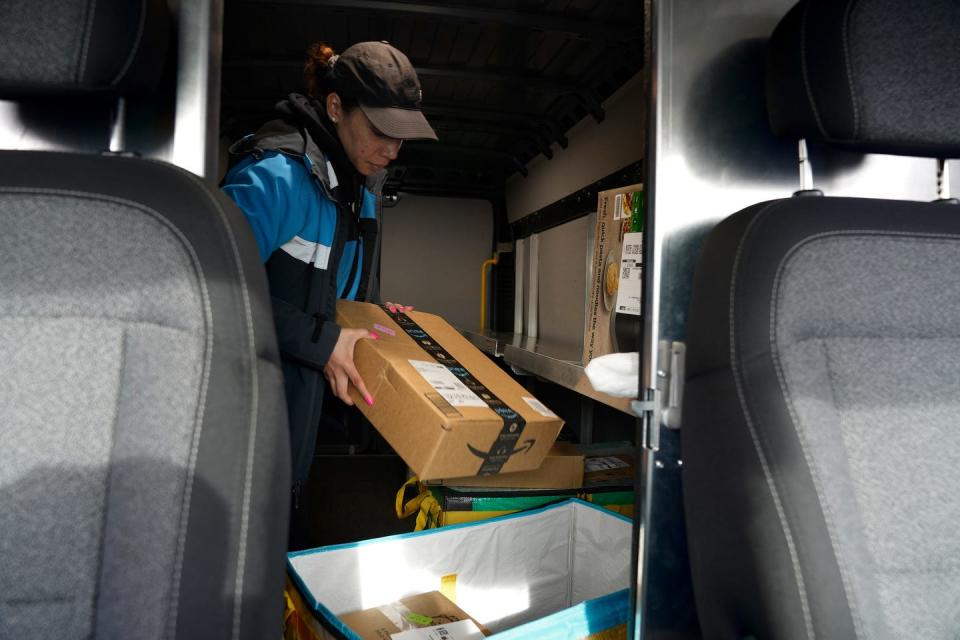
How and when did Wutabon expand to Rhode Island?
When Amazon asked the nonprofit to apply, it represented a big challenge for Chong's group, which had operated in New York and Massachusetts but never in Rhode Island. When Chong looked at Rhode Island's demographics, it seemed like a perfect fit.
RI Census takeaways: RI Census takeaways: Where did white people go? Counting Latinos. A Trump effect?
The state's "huge" immigrant population offered a significant pool of workers amid a national labor shortage. But for Wutabon, a newcomer to the state, tapping into that resource had its challenges, Chong said.
"Inside the organization, it was grinding 101," Chong said. "We'd come to the local communities every day and meet with community leaders and individuals. We'd go to the grocery stores, supermarkets, talk to whomever we came across."
Since starting here a year ago, the organization has hired more than 400 immigrants in Providence, although some find the delivery work to be too hard, too cold, or just not to their liking.
Census 2020:Growth in cities drove RI population increase in 2020 Census
Stable hours, safe working conditions a major bonus for workers
Rivera said one of her favorite parts of the job is the stability. Work starts at the same time every day, with a team meeting at 10:15 followed by the drive to load up the vans. Then she starts her route. Even when the van is filled, with 200 to 300 packages, she can usually finish by 7 or 8 p.m.
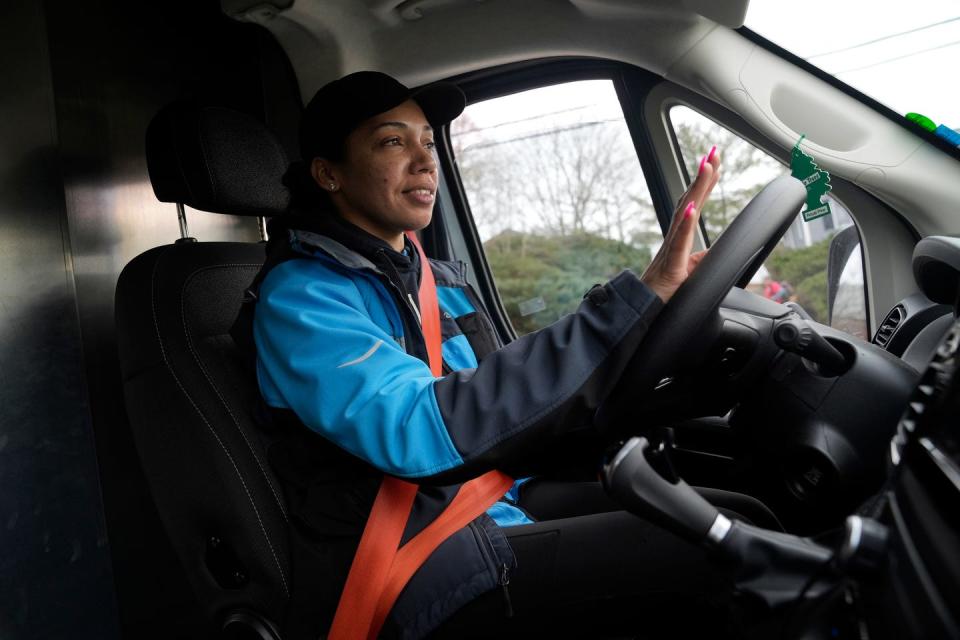
When she first started, her route was 300 packages to the University of Rhode Island. Pulling into the loading dock, she had to scan each package individually, but once she was done, she was done for the day.
Anger over terrible scheduling was the top reason people quit hourly jobs, according to a 2021 survey, but that's a problem Wutabon avoids with delivery schedules that don't change.
Bringing classes to the workers
Driver Richard Beloz, 23, was referred by a friend to Wutabon, and he has been taking the offered English lessons, which the organization adjusts to suit the schedules of its workers.
"I'm more comfortable now," he said. "Now, I talk more English."
Chong said he understands the unique hurdles immigrants face while living and working in a new country: learning English, obtaining work visas or green cards, and navigating bureaucracies that compound the language barrier by using specialized jargon. That's where the English and citizenship classes come in.
Operations manager Ligia Diaz addresses the gathered circle of delivery drivers and dispatchers in English, and then in Spanish. Next to one of the vans, she has set up fruit and pastries, a staple of Thursday mornings.
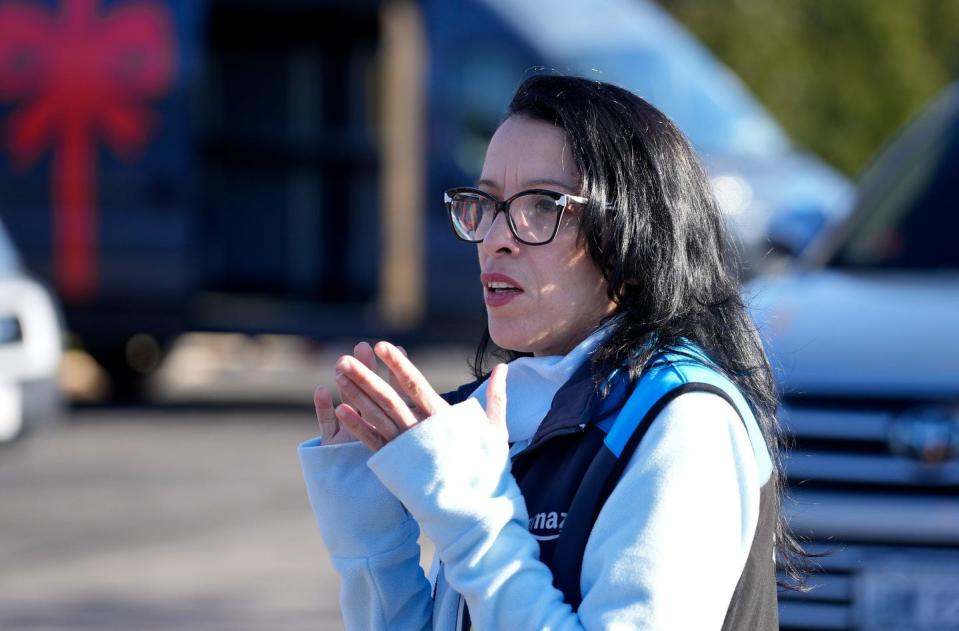
Originally from Puerto Rico, Diaz said coming to the mainland made her feel like an immigrant, having to learn English and a slightly different culture.
When workers show up for a few months, take a citizenship class or a few English lessons and then move on to another job, Diaz isn't hurt. This, she said, is what is supposed to happen.
"Often, this is a steppingstone," she said. "This work is hard work."
That's also why the organization offers its employees other avenues of employment, in the hospitality industry, in hospitals, or in food service. The group is working to get workers the skills and education they need to receive certifications in the medical field — certified nursing assistants and licensed practical nurses.
Working for no pay:Migrants are helping rebuild Florida after Hurricane Ian. They might not get paid for it.
Quincy Asian Resources is paying $18 to $22 an hour, which, without overtime, works out to $37,000 to $46,000 a year.
Immigrants are also one of the most preyed-upon groups in the workforce, facing a greater risk of exploitation, dangerous working conditions, wage theft and physical and emotional abuse. Giving them a good job opportunity means they can advance and get a better understanding of how to navigate the system, Chong said.
For many employees, this is the first job in which they have received paid time off, Chong said.
Most referrals come from word of mouth, he said. In Providence, 90% of the immigrant workforce for the nonprofit is Latino. Chong said he has started to learn Spanish to better help the employees.
While undocumented immigrants will have to wait until July 2023 to get a driving permit in Rhode Island, anyone who has legal residency can obtain a driver's license in the state.
A blueprint for success for other employers?
With Wutabon's success working for one of the nation's biggest employers, Chong said he hopes to take his business model to the rest of the country.
"We know immigrants are not just in one location," he said. "This country was built on immigrants and refugees."
Immigrants in need of a little extra help are everywhere.
And right now in Providence?
"We're hiring," Chong said. "We're constantly looking for more people."
Reach reporter Wheeler Cowperthwaite at wcowperthwaite@providencejournal.com or follow him on Twitter @WheelerReporter.
This article originally appeared on The Providence Journal: RI immigrants find jobs and more through nonprofit's Amazon partnership

